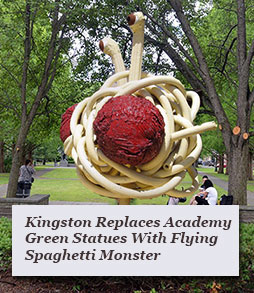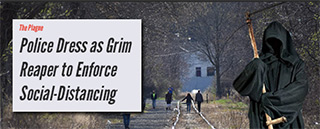
KINGSTON- Unprecedented nationwide protests calling for police reform and an end to systemic racism following the death of George Floyd have caused many cities to re-imagine their approach to law enforcement. For some, that means increased training for officers and ending qualified immunity. Others, like Minneapolis, MN and Kingston, NY, are taking more sweeping action.
The Kingston Common Council recently passed a bill to abolish the Kingston Police Department and replace it with a herd of goats, dubbed the Kingston Civil Goat Patrol (KCGP). The KCGP is now responding to all calls that formerly would have been directed to the city’s police department, as well as handling duties such as crowd control and road patrol.
The KCGP live and work out of the former police station on Garraghan Dr., which has been converted into a barn in the Dutch colonial style. When a call comes in, KCGP officers are loaded into a livestock trailer by city employees and dispatched to the scene.
The city’s police department had come under fire in recent years for the alleged use of excessive force. One resident, who was tased, was awarded a financial settlement last fall. Another similar incident prompted protest, but was dismissed.
Kingston Mayor Steve Abelard said since instituting the KCGP, complaints about excessive force, discriminatory traffic stops and illegal searches have fallen to zero— all with no discernible drop in the murder clearance rate.
While some critics have said the KCGP doesn’t actually investigate crimes or make arrests — formerly considered essential functions of any law-enforcement agency — Abelard counters that those ideas represent “outmoded thinking… being a peace officer isn’t about making arrests and sending people to jail. It’s about creating mutual trust and a feeling of safety, de-escalating conflict and fostering understanding.”
Many city residents were surprised the Common Council took such bold action. Some told us they’re not sure the Civil Goat Patrol is up to the job, but they’re cautiously optimistic. “At least these goats ain’t tasing anyone,” said Clarissa Bennett, 25.
The reaction among residents to the goats is certainly different than to police officers.
“Being around a cop is always tense,” said Sean Shields, 38. “They don’t know what you’re going to do, you don’t know what they’re going to do, and at least one of you has a deadly weapon. You always feel like maybe you did do something, even when you’re innocent. It’s not like that with the goats.”
While reporting this story, we witnessed the Civil Goat Patrol in action when Key Bank’s Uptown branch was robbed. Normally the response would be a cacophony of sirens, roads blocked off, police tape cordoning off the scene and officers aggressively combing the area for suspects.
This time, there were no sirens. Instead, about 20 minutes later, the faint but discernible, music-box jingle of “The Farmer in the Dell” could be heard growing louder as the patrol made its way up Wall Street. As it came into sight, the assembled crowd applauded and the chant went up, “Goat Patrol! Goat Patrol! Goat Patrol!” As the goats were unloaded, spectators commented on the patrol’s snazzy uniforms and children were encouraged to pet the officers. The goats meandered around the scene for a while, ate several tulips at the Old Dutch Church, investigated the contents of a city trash receptacle and playfully headbutted a few rambunctious youngsters, before being loaded back into their trailer and departing.
“That was great,” said Jennifer DiSalle, 32, of Green St.
The mayor said the new patrol offers a badly needed cost-savings for a city budget devastated by the pandemic and resulting economic lockdown.
“The KCGP has many advantages over the old KPD,” said Abelard. “Our city police department was over $10 million, about 1/4 of our entire city budget, and that proportion was rising due to fixed health insurance and pension costs. The KCGP budget is only a fraction of that, and KCGP officers help defray that cost by keeping city parks clear of weeds in their off hours.”
According to Abelard, the single largest expense for the reconstituted department is the payroll for the city employees who transport the goats to and from calls. “We’re launching a pilot program to replace those employees with border collies,” he said.




